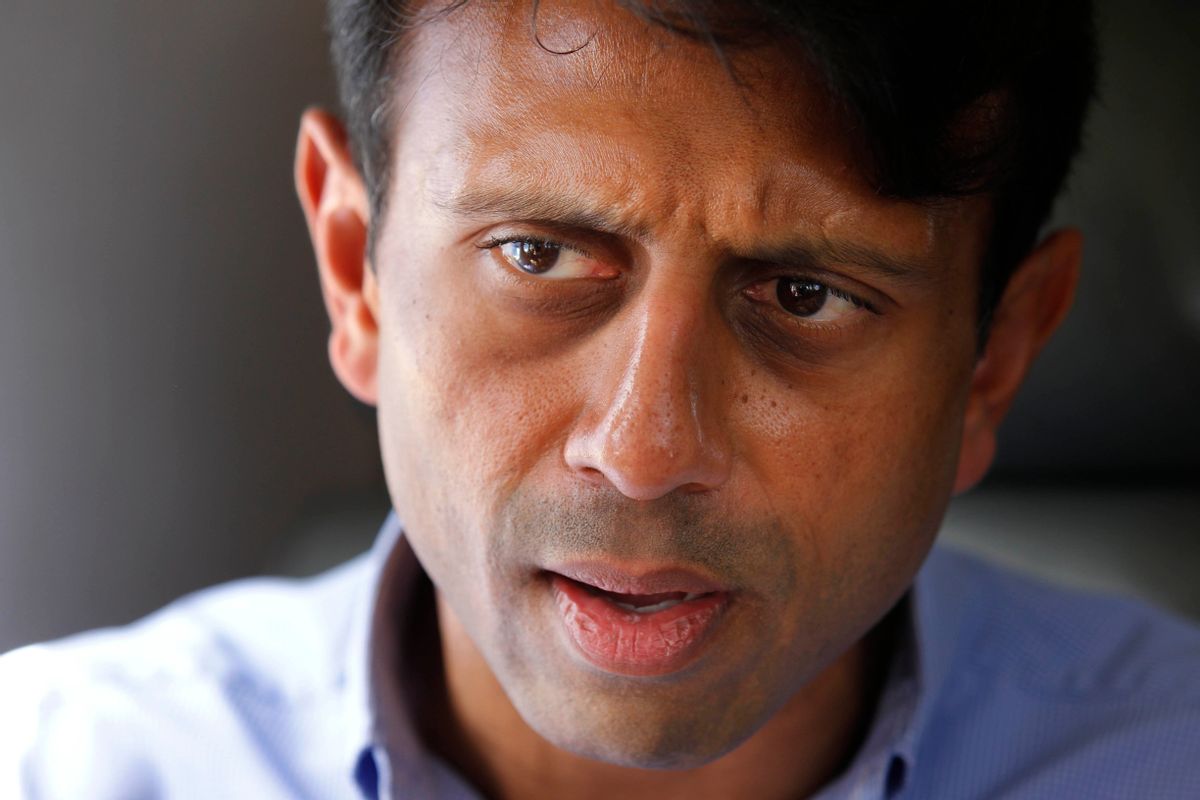As the GOP continues to rip itself asunder over the ascendance of Donald Trump, conservatives and Republicans find themselves staring down a host of difficult questions. How did this happen? Why did no one see this coming? What explains the dogged popularity of a nakedly xenophobic and unapologetically shallow cretin who offers little more than hypermasculine posturing and crude appeals to nationalism? The answers to these questions will be hard for conservatives and the party elite to hear, as they will very likely reveal deep, catastrophic cracks within the movement and massive institutional failures on the part of the GOP.
Presumably, there are some people on the right who are trying to honestly grapple with these questions and make a good-faith attempt at figuring out what has gone wrong. Others, however, have arrived at a simple, much more satisfying conclusion: Donald Trump is Barack Obama’s fault.
That’s the thesis laid out Friday in a Wall Street Journal Op-Ed by Bobby Jindal, the disastrously unpopular former governor of Louisiana who ran a brief, sad campaign for the White House and has now booked passage on Marco Rubio’s sinking ship. By Jindal’s reckoning, Trump is simply a reaction to the Obama presidency. We’ve had eight years of the “cool, weak and endlessly nuanced” Barack Obama, he argues, which means now voters are hungry for the precise opposite – they want “a strong leader who speaks in short, declarative sentences.” Per Jindal: “You can draw a straight line between a president who dismisses domestic terrorist attacks as incidents of workplace violence and a candidate who wants to ban Muslims from entering the country.”
This is some of the dumbest, laziest political analysis you’re likely to see this side of Tom Friedman. The point that must be made here is that it’s not “Americans” broadly speaking who are embracing Trump – it’s Republicans. His popularity is largely confined to a segment of the Republican electorate that is in open revolt against its own party. Trump is running as much against the Republican establishment as he is the Obama legacy, and his popularity is drawn, in part, from the fact that he lashes out at the GOP elites for the ways they’ve failed their own constituents.
Let’s use Bobby Jindal as an example of how Trumpism came to dominate the GOP. Jindal, a former rising star of the party, was comfortably elected governor of deep red Louisiana and pursued an extremely conservative economic policy that paired hugely regressive tax cuts with deep spending cuts. A slowly recovering state economy and falling oil prices resulted in massive budget shortfalls that forced Jindal to cut spending even further and rely on transparent budget gimmickry just so he could stay faithful to the promise he made to Grover Norquist to never raise taxes. As the state crumbled under the weight of its budget problems, Jindal’s approval rating cratered to the point that he was less popular in his own state than the Democratic president. When it came time for voters in the state to select Jindal’s successor, they voted in Democrat John Bel Edwards by a whopping 12-point margin (just three years earlier, Mitt Romney carried the state by 17 points over Barack Obama).
And while Jindal was busily failing his own constituents and destroying his state’s economy, he was also pandering to the ugliest strains of bigotry and xenophobia that course through the conservative movement. It was Jindal, remember, who loudly and defiantly insisted (despite a complete lack of evidence) that pockets of European cities had been closed off by fundamentalist Muslims and were considered “no-go zones” for non-Muslims. And it was Bobby Jindal who brought the phrase “immigration without assimilation is invasion” to the 2016 campaign trail. When he was still a candidate, Jindal tried to catch Trump’s anti-immigrant wave by calling for an end to birthright citizenship and arguing that mayors of “sanctuary cities” should be arrested.
That's the Jindal experience in a nutshell – an elite Republican who pandered to the worst elements of his base while pursuing policies that were designed to further his political ambitions at the expense of the people he represented. Not for nothing, Louisiana Republicans are expected to vote overwhelmingly for Trump in this weekend’s primary.
Jindal, like so many other Republicans, has tried very hard to capitalize on the same forces that are buoying Trump – anti-immigrant nativism and anti-Muslim xenophobia. Now he’s trying to argue that Trump’s popularity has nothing to do with the Republican Party’s years-long strategy of aggravating racial and ethnic resentments to scare up votes from white conservatives. Instead, he says, it’s all Obama’s fault. It’s a willful delusion that lets guilty actors like Jindal forego their own culpability in transforming the GOP into the party of Trump.

Shares